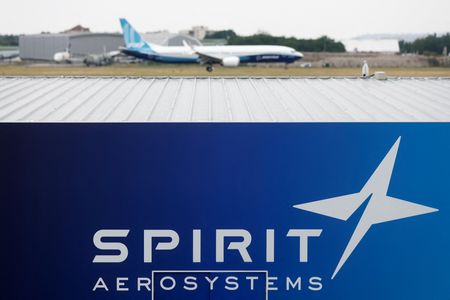By Tim Hepher, Shivani Tanna and Mike Stone
(Reuters) -Boeing agreed to buy back Spirit AeroSystems for $4.7 billion in stock and Airbus moved to take on the supplier’s loss-making Europe-focused activities in return for hundreds of millions of dollars of compensation in a rare coordinated move.
The near-two-decade independence of the world’s largest standalone aerostructures company ended in a carve-up between its largest customers after the Boeing 737 MAX crisis sparked by a mid-air door plug blowout in January brought to a head doubts over the resilience of fuselage manufacturing.
Boeing, which spun off Spirit in 2005, said it would buy its former subsidiary for about $37.25 per share, as reported by Reuters on Sunday, giving it an enterprise value of $8.3 billion including debt.
“Bringing Spirit and Boeing together will enable greater integration of both companies’ manufacturing and engineering capabilities, including safety and quality systems,” Spirit CEO Pat Shanahan said in a statement.
Spirit’s shares closed at $32.87 on Friday. The Wichita, Kansas-based company said the deal value offered a 30% premium since the day before Boeing and Spirit announced merger talks on March 1.
Boeing has long pondered buying back its former subsidiary, which analysts say has struggled to thrive independently despite diversifying into work for Europe’s Airbus and others.
But the decision to go ahead comes as Boeing tries to resolve a sprawling corporate and industrial crisis that has engulfed one of the industry’s key suppliers.
Boeing is trying to move past months of difficulties sparked by the Jan. 5 blowout of a door plug on a virtually new Alaska Airlines 737 MAX 9 jet that exposed industrial quality problems.
Those issues have led to a substantial slowdown in output at Boeing, rippling across the global commercial aviation industry.
The U.S. planemaker has announced the planned departure of its CEO, Dave Calhoun in the wake of the crisis, with industry executives and analysts pointing to Spirit’s Shanahan, a former Boeing executive, as one of the possible replacements.
It was not immediately clear how long he might be tied to Spirit, with the Boeing deal not due to close until mid-2025.
AIRBUS DEAL
Spirit, the manufacturer of the door plug, had been spun off from Boeing in one of a series of moves that critics say were emblematic of a focus on cost-cutting over quality.
Boeing made the decision to buy back Spirit in the aftermath of the door plug blowout, in what it described as an effort to address its safety problems and shore up its production line.
Separately, Airbus, also a Spirit customer, confirmed it would take over core activities at four of the supplier’s plants in the United States, Northern Ireland, France and Morocco as reported by Reuters last week.
It will also take over minor work currently carried out in Wichita. The separate Airbus deal was triggered by talks between Boeing and Spirit and was loosely coordinated between the three companies, sources said. It is subject to due diligence.
Airbus shares opened 2.4% higher on Monday.
Because the Airbus-related activities lose money, industry sources had said the European planemaker was pressing for up to $1 billion in compensation in return for taking over the plants, which make strategic parts for the A350 and A220 jets.
Airbus said it would receive $559 million in compensation from Spirit, depending on the final outlines of the deal, while it would pay the supplier a symbolic $1 for the assets.
That echoes its decision to buy the Canadian-designed CSeries small jetliner program for just $1 from Bombardier in 2018. It later renamed the jet the A220.
Until the latest shake-up, Airbus had not proposed to take control of the high-tech but loss-making A220 wings manufacturing carried out in a historic plant in Belfast, which Spirit bought from Bombardier in 2019.
Monday’s deal lifts doubts over the future of Northern Ireland’s top industrial employer for the second time in five years, though sources have said Airbus may need to invest $1 billion to $2 billion in a redesign to make the wings affordable to produce.
Spirit said it also planned to sell businesses and operations in Prestwick, Scotland and in Subang, Malaysia that support Airbus programs and those in Belfast that do not support Airbus programs.
(Reporting by Mike Stone and David Shepardson in Washington, Allison Lampert in Montreal, Tim Hepher in Paris and Shivansh Tiwary, Abhijith Ganapavaram and Shivani Tanna in Bengaluru; Editing by David Gaffen, Shubham Kalia and Jamie Freed)











